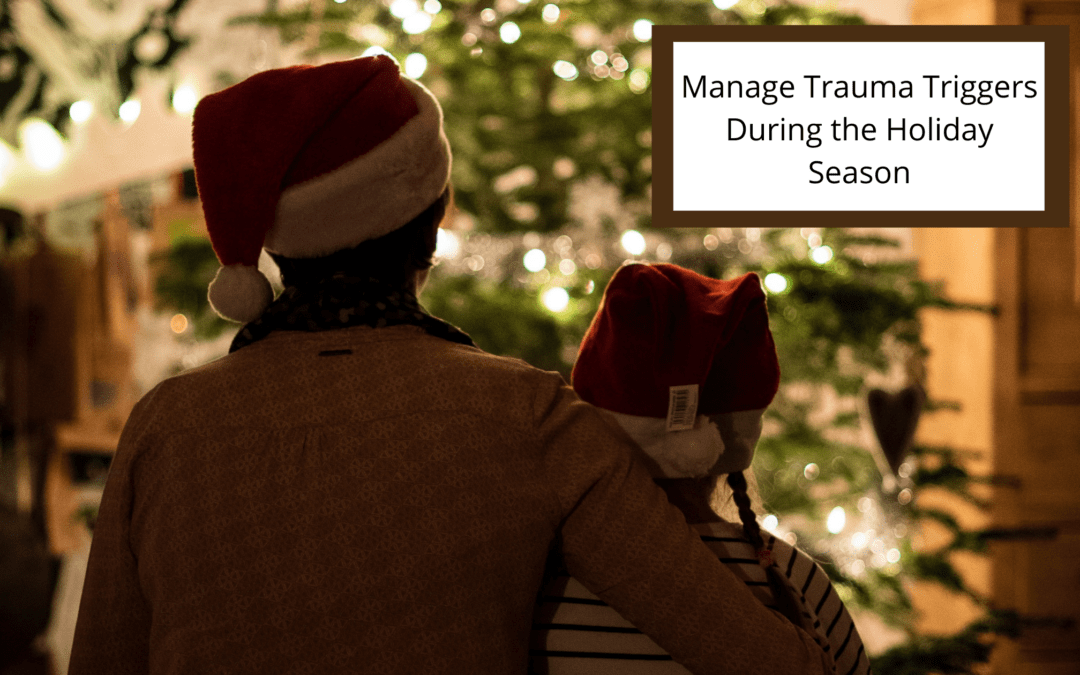So, it’s the most wonderful time of the year, right? For many people, this is probably true, but if you struggle with memories from a past traumatic experience related to the holidays, this time of the year can be a struggle. Those favorite holiday traditions you used to look forward to suddenly transform into annual events that you dread because you know you’re going to feel anxious, upset, sad, angry, or experience other intense emotions. All the while, your loved ones seem to expect you to put on a happy and be your best self. That’s a lot of emotion and a lot of pressure. It’s no wonder so many people struggle with trauma triggers during the holiday season. In this blog, we’ll take a look at how to manage your trauma triggers at the holidays.

Do an Emotional Self-Check
Let’s start managing your trauma response with an emotional self-check you can do right now. Before we start, remember, it’s okay to feel exactly how you feel right now. We’re often told that feelings are good or bad and positive or negative. Feelings are just feelings, so let’s approach them from a place of non-judgment. Whether you’re dreading the holidays, angry at loved ones who are pressuring you to attend triggering events, you’re sad because a lost loved one won’t be here to enjoy the season with you, or you feel any other way, that’s perfect. You are not doing the holidays wrong or missing out. You are being authentic to your lived experience. Now, take a few deep breaths. Really think about the strongest emotion you feel when you’re thinking about the holiday season. Where does it come from? What memories does this feeling bring up? How do you feel in your body when you’re experiencing this emotion? Really sit with this feeling for a minute or two and continue taking deep breaths. How do you feel now? If you feel a little better, that’s great. Evidence-supported therapy practices indicate that accepting, experiencing, and striving to understand our emotions can be very beneficial, especially compared to repressing or ignoring emotions in hopes they will go away. If you still feel triggered, that’s okay too. Everyone processes emotions differently. Take a few more minutes to sit with your feelings and thoughts if you need it. Then, give yourself permission to do something else for a while. Get up and go for a walk. Call a friend to chat. Do the dishes.
Prioritize Self-Care
Many people get busy at the holidays, and suddenly, all their daily routines are out the window. They find themselves not getting enough sleep, skipping their trips to the gym, and eating holiday sweets and treats instead of nutritious meals. It’s easy to do at this time of the year, but if you experience increased trauma triggers at the holidays, it’s very important to prioritize caring for your physical body as well as your emotional and mental health. Our culture often talks about self-care as things like hours-long bubble baths or luxuriating in a moisturizing sheet mask each night. If these things are important to you, make time for them, but true self-care is just what the name implies – taking good care of yourself. Get enough sleep, exercise, eat nutrient-rich foods, and make time for hygiene and healthcare.

Set Boundaries & Limits
Maybe your family expects you to be with them 24/7 through the holidays, but you don’t have to do that. You don’t have to do anything that makes you feel unsafe, uncomfortable, or triggered emotionally. Setting boundaries and limitations can help you prepare for holiday gatherings and relieve a little of the anxiety and worry that can build beforehand. By making a plan for how to manage triggering family members or events in advance, you reclaim a sense of stability and control in the situation. Some examples of good boundaries and limitations include:
- Letting loved ones know you need to leave a gathering by a specific time.
- Not spending too much time with specific loved ones who make you feel triggered or unsafe.
- Speaking up if loved ones are making you feel uncomfortable or unsafe. It can be difficult but setting a boundary with this loved one once can help mitigate future issues.
- Leaning on your support system. Let a loved one you trust know you’re having a tough time and ask them to keep an eye out or check in on you regularly.
- Not letting loved one’s challenge or change your boundaries. If you want to change a boundary or limit, that’s fine, but don’t let go of your boundary for anyone else.

You’re Not in this Alone
Finally, now is the time to schedule counseling sessions to ensure you have the support you need through the holidays and after. Even if you do a great job managing complex emotions and navigating struggles throughout the year, the holidays may be an important time to check in with a therapist who can help you develop good coping skills to get through this confronting time of the year. The LMV Counseling team would love to hear from you. Get started now by filling out our simple scheduling request form.

